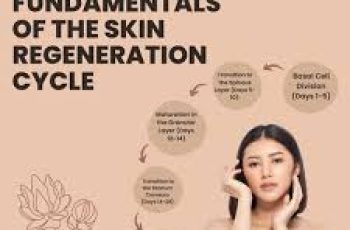
The JNK Gene and Skin Health
Activating the JNK gene can speed skin aging. Activation of the JNK gene (c-Jun N-terminal kinases) plays a critical role in stress response pathways in cells, including those in the skin. When the JNK pathway is activated, it can lead to several cellular responses that are detrimental to skin health and appearance.
The goal of an antiaging skincare routine is to prevent activation of the JNK gene. (It is pronounced like “junk”).
Why the JNK Gene Causes Skin Aging
Below I give a simplified explanation of why the activation of JNK is considered unfavorable, especially in the context of increasing collagenase activity and causing skin to age.
Promotion of Collagen Breakdown
JNK activation can increase the production of collagenase, an enzyme responsible for the breakdown of collagen. Collagen is a crucial protein that provides structure, strength, and elasticity to the skin. By increasing collagenase levels, JNK activation leads to accelerated degradation of collagen, contributing to the loss of skin firmness and the development of wrinkles.
Fortunately, there are many common ingredients that stimulate collagen synthesis. Some examples of ingredients that stimulate collagen are: salicylic acid, Vitamin C, growth factors, and many more.
Make sure to take the Baumann Skin Type Quiz for free today to make sure you only get collagen stimulating products that are right for your specific skin type!
Contribution to Inflammation:
The JNK pathway is also involved in promoting inflammatory responses. Chronic inflammation can further damage skin structures, including collagen and elastin fibers, exacerbating aging signs and other skin conditions. If you have inflammation concerns, due to the JNK gene or otherwise, make sure to check out this blog all about thescience of inflammation! You can also check out this full dictionary of anti-inflammatory ingredients!
Enhancement of UV Damage
Exposure to UV radiation is a known activator of the JNK pathway. The resulting increase in collagenase contributes to the breakdown of collagen faster than it can be replaced, particularly following UV exposure. This mechanism is a key factor in photoaging, where the skin ages prematurely due to sun exposure
What is the JNK Gene?
The JNK gene (c-Jun N-terminal kinases) refers to a family of protein kinases that play a significant role in regulating cellular responses to stress. These enzymes are part of the mitogen-activated protein kinase (MAPK) family, which includes several pathways that transmit signals from the cell surface to the nucleus, affecting a wide range of cellular processes including proliferation, differentiation, survival, apoptosis (programmed cell death), and stress responses.
JNKs are activated in response to various stressors, such as UV radiation, reactive oxygen species (ROS), cytokines, and heat shock. Upon activation, JNKs translocate to the nucleus where they phosphorylate their target substrates, including the transcription factor c-Jun, part of the activator protein-1 (AP-1) complex. The AP-1 complex then regulates the expression of genes involved in cell death, survival, and inflammation, among other processes.
The role of JNKs in the skin, particularly in relation to UV exposure and oxidative stress, is critical. Activation of JNK pathways can lead to the upregulation of enzymes that degrade collagen, such as matrix metalloproteinases (MMPs), thereby contributing to the aging process and the development of conditions like wrinkles and loss of skin elasticity. Moreover, JNK activation is associated with inflammatory responses in the skin, which can exacerbate damage and promote aging and skin diseases.
Understanding the function and regulation of JNK is important in dermatology and skincare, as targeting this pathway could offer therapeutic strategies for treating various skin conditions, including aging, inflammation, and cancer.


